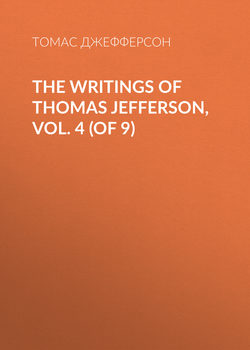Читать книгу The Writings of Thomas Jefferson, Vol. 4 (of 9) - Томас Джефферсон, Thomas Jefferson - Страница 23
TO MR. HAMMOND
ОглавлениеPhiladelphia, September 9, 1793.
Sir,—I have the honor to acknowledge the receipt of your two memorials of the 4th and 6th instant, which have been duly laid before the President of the United States.
You cannot be uninformed of the circumstances which have occasioned the French squadron now in New York to seek asylum in the ports of the United States. Driven from those where they were on duty, by the superiority of the adverse party in the civil war which has so unhappily afflicted the colonies of France, filled with the wretched fugitives from the same scenes of distress and desolation, without water or provisions for the shortest voyage, their vessels scarcely in a condition to keep the sea at all, they were forced to seek the nearest ports in which they could be received and supplied with necessaries. That they have ever been out again to cruise, is a fact we have never learned, and which we believe to be impossible, from the information received of their wants and other impediments to active service. This case has been noted specially, to show that no inconvenience can have been produced to the trade of the other belligerent powers, by the presence of this fleet in our harbors. I shall now proceed to more general ground.
France, England and all other nations have a right to cruise on our coasts; a right not derived from our permission, but from the law of nature. To render this more advantageous, France has secured to herself, by a treaty with us, (as she has done also by a treaty with Great Britain, in the event of a war with us or any other nation) two special rights. 1. Admission for her prizes and privateers into our ports. This, by the seventeenth and twenty-second articles, is secured to her exclusively of her enemies, as is done for her in the like case by Great Britain, were her present war with us instead of Great Britain. 2. Admission for her public vessels of war into our ports, in cases of stress of weather, pirates, enemies, or other urgent necessity, to refresh, victual, repair, &c. This is not exclusive. As then we are bound by treaty to receive the public armed vessels of France, and are not bound to exclude those of her enemies, the executive has never denied the same right of asylum in our ports to the public armed vessels of your nation. They, as well as the French, are free to come into them in all cases of weather, piracies, enemies, or other urgent necessity, and to refresh, victual, repair, &c. And so many are these urgent necessities, to vessels far from their own ports, that we have thought inquiries into the nature as well as the degree of the necessities which drive them hither, as endless as they would be fruitless, and therefore have not made them. And the rather, because there is a third right, secured to neither by treaty, but due to both on the principles of hospitality between friendly nations, that of coming into our ports, not under the pressure of urgent necessity, but whenever their comfort or convenience induces them. On this ground, also, the two nations are on a footing.
As it has never been conceived that either would detain their ships of war in our ports when they were in a condition for action, we have never conceived it necessary to prescribe any limits to the time of their stay. Nor can it be viewed as an injury to either party, to let their enemies lie still in our ports from year's end to year's end, if they choose it. Thus, then, the public ships of war of both nations enjoy a perfect equality in our ports; first, in cases of urgent necessity; secondly, in cases of comfort or convenience; and thirdly, in the time they choose to continue; and all a friendly power can ask from another is, to extend to her the same indulgences which she extends to other friendly powers. And though the admission of the prizes and privateers of France is exclusive, yet it is the effect of treaty made long ago, for valuable considerations, not with a view to the present circumstances, nor against any nation in particular, but all in general, and may, therefore, be faithfully observed without offence to any; and we mean faithfully to observe it. The same exclusive article has been stipulated, as was before observed, by Great Britain in her treaty with France, and indeed is to be found in the treaties between most nations.
With respect to the usurpation of admiralty jurisdiction by the consuls of France, within these States, the honor and rights of the States themselves were sufficient motives for the executive to take measures to prevent its continuance, as soon as they were apprized of it. They have been led by particular considerations to await the effect of these measures, believing they would be sufficient; but finding at length they were not, such others have been lately taken as can no longer fail to suppress this irregularity completely.
The President is duly sensible of the character of the act of opposition made to the serving of legal process on the brig William Tell, and he presumes the representations made on that subject to the minister of France, will have the effect of opening a free access to the officer of justice, when he shall again present himself with the precept of his court.
I have the honor to be, with great respect, Sir, your most obedient, and most humble servant.
